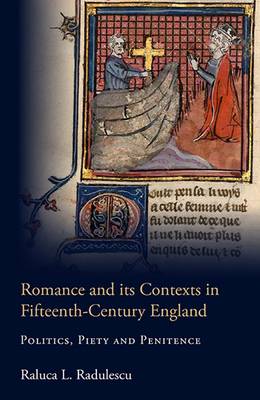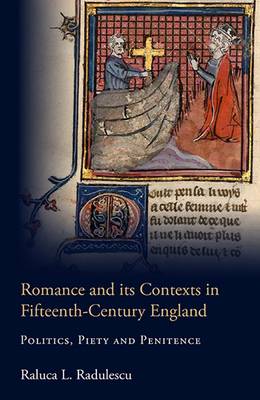
- Afhalen na 1 uur in een winkel met voorraad
- Gratis thuislevering in België vanaf € 30
- Ruim aanbod met 7 miljoen producten
- Afhalen na 1 uur in een winkel met voorraad
- Gratis thuislevering in België vanaf € 30
- Ruim aanbod met 7 miljoen producten
Zoeken
Romance and Its Contexts in Fifteenth-Century England
Politics, Piety and Penitence
Raluca L Radulescu
Hardcover | Engels
€ 177,45
+ 354 punten
Omschrijving
Although the anonymous pious Middle English romances and Sir Thomas Malory's Morte Darthur have rarely been studied in relation to each other, they in fact share at least two thematic concerns, vocabularies of suffering and genealogical concerns, as this book demonstrates. By examining a broad cultural and political framework stretching from Richard II's deposition to the end of the Wars of the Roses through the prism of piety, politics and penitence, the author draws attention to the specific circumstances in which Sir Isumbras, Sir Gowther, Roberd of Cisely, Henry Lovelich's History of the Holy Grail and Malory's Morte were read in fifteenth-century England. In the case of the pious romances this implies a study of their reception long after their original composition or translation centuries earlier; in Lovelich's case, an examination of metropolitan culture leads to an opening of the discussion to French romance models as well as English chronicle writing.
Specificaties
Betrokkenen
- Auteur(s):
- Uitgeverij:
Inhoud
- Aantal bladzijden:
- 252
- Taal:
- Engels
Eigenschappen
- Productcode (EAN):
- 9781843843597
- Verschijningsdatum:
- 18/09/2013
- Uitvoering:
- Hardcover
- Formaat:
- Genaaid
- Afmetingen:
- 156 mm x 234 mm
- Gewicht:
- 530 g

Alleen bij Standaard Boekhandel
+ 354 punten op je klantenkaart van Standaard Boekhandel
Beoordelingen
We publiceren alleen reviews die voldoen aan de voorwaarden voor reviews. Bekijk onze voorwaarden voor reviews.







